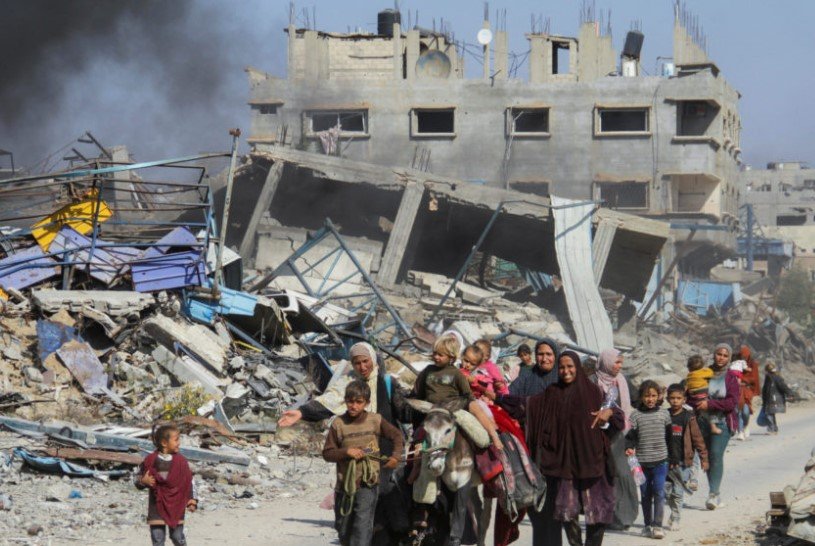Foreign ministers denounce worsening humanitarian toll and accuse Israeli government of obstructing critical relief access
Canada and 24 other countries have issued a stark appeal to Israel: stop the war in Gaza. In an unusually forceful joint statement, the group condemned what they called the “drip-feeding” of humanitarian aid and warned that Israel’s policies were deepening civilian suffering and fueling instability across the region.
The signatories, which include several European Union states, are among Israel’s long-time allies—making this collective rebuke particularly striking. It comes amid growing global frustration over what many describe as a slow, deliberate throttling of aid deliveries and relentless bombing in civilian areas.
“Suffering has reached new depths,” say foreign ministers
The letter, signed by the countries’ foreign ministers and released Monday, offered little diplomatic cushioning.
“The Israeli government’s aid delivery model is dangerous, fuels instability and deprives Gazans of human dignity,” it reads. “We condemn the drip-feeding of aid and the inhumane killing of civilians, including children, seeking to meet their most basic needs of water and food.”
While the statement avoids explicitly calling Israeli military actions war crimes, it uses unusually blunt language to highlight the scale of the humanitarian catastrophe. The phrase “new depths” has triggered a flurry of commentary among international aid workers, many of whom say conditions in northern and central Gaza are now worse than any point since the conflict began.
Canada’s growing discomfort with Israel’s strategy
Canada’s inclusion in the letter is particularly noteworthy. While Ottawa has generally stood by Israel’s right to self-defense, public pressure and mounting death tolls in Gaza have pushed the Trudeau government toward more critical language in recent months.
Foreign Affairs Minister Mélanie Joly, one of the statement’s signatories, said on Monday that Canada “can no longer remain silent” in the face of what she described as “a deliberate blockage of life-saving aid.”

It’s a marked shift from the government’s position earlier this year, when Canadian officials largely echoed Israeli talking points about the need to dismantle Hamas and prevent arms smuggling into Gaza.
But now, with over 38,000 Palestinians reportedly killed—many of them women and children—Ottawa is under mounting pressure from civil society groups, opposition lawmakers, and even some of its own caucus to re-evaluate its stance.
What countries are calling for, and what Israel may do next
The joint statement doesn’t just criticize—it lays out expectations. The countries are calling for:
-
An immediate ceasefire in Gaza
-
Unfettered access to humanitarian aid
-
Respect for international law, including protection of civilians
-
An end to attacks on aid convoys and distribution centers
Despite the rising pressure, Israel’s response so far has been defiant. A senior official in Prime Minister Benjamin Netanyahu’s office told Israeli media that “foreign governments don’t understand the stakes,” adding that Hamas’s presence in Gaza “continues to justify military action.”
Still, there are signs of strain within Israel’s leadership. Defense Minister Yoav Gallant reportedly told U.S. envoys last week that Israel is “reviewing” its coordination processes with aid agencies—though critics say little has changed on the ground.
Humanitarian situation deteriorating fast
The numbers are grim. According to the UN Office for the Coordination of Humanitarian Affairs (OCHA), more than 70% of Gaza’s population is now displaced. Food insecurity is at record levels, with over 90% of households going multiple days without full meals.
Access to clean water has collapsed, and hospitals continue to operate without anesthetics or electricity. Entire districts of Gaza City and Khan Younis have been reduced to rubble.
The aid that does make it through often does so at a trickle. Trucks wait for days at the Rafah or Kerem Shalom crossings, only to be turned back or subjected to delays and reinspection.
In March, the World Food Programme described the situation as “catastrophic, man-made, and preventable.”
A growing rift between Israel and the West
This latest joint letter is just the most visible sign of a widening diplomatic rift. While the U.S. has not signed the letter, even Washington has begun voicing stronger criticism of Israeli conduct—especially as civilian casualties mount and footage from aid distribution chaos circulates on social media.
France, Germany, and the Netherlands—usually careful not to alienate Israel—have all co-signed the latest statement. Some analysts see this as a tipping point.
“It’s no longer about behind-the-scenes diplomacy,” said Efraim Katz, a Middle East fellow at the Brussels Policy Forum. “Western capitals are trying to protect their own moral credibility at this point.”
A comparison of recent diplomatic statements reveals the shift:
| Country | Early 2024 Position | July 2025 Statement |
|---|---|---|
| Canada | Supports Israel’s right to defend | Condemns obstruction of aid |
| France | Calls for restraint | Demands immediate ceasefire |
| Germany | Opposes ceasefire resolution | Signs letter urging war to end |
| Netherlands | Urges balanced approach | Calls Israeli aid strategy “inhumane” |
The only major Western holdouts: the United States and the United Kingdom, both of which have stopped short of calling for a ceasefire, though they continue to demand improved humanitarian access.
What happens next?
For Israel, the pressure is clearly building—but whether it leads to any meaningful change is far from certain.
In Gaza, aid workers say the situation has reached a point where even a ceasefire wouldn’t be enough. The entire system of logistics, warehouses, health services, and food distribution has collapsed. And while condemnation might sting diplomatically, it doesn’t move trucks through closed crossings.
One UN staffer, speaking anonymously from southern Gaza, put it bluntly: “Condemnations won’t fill stomachs. We need access. Not just words.”
